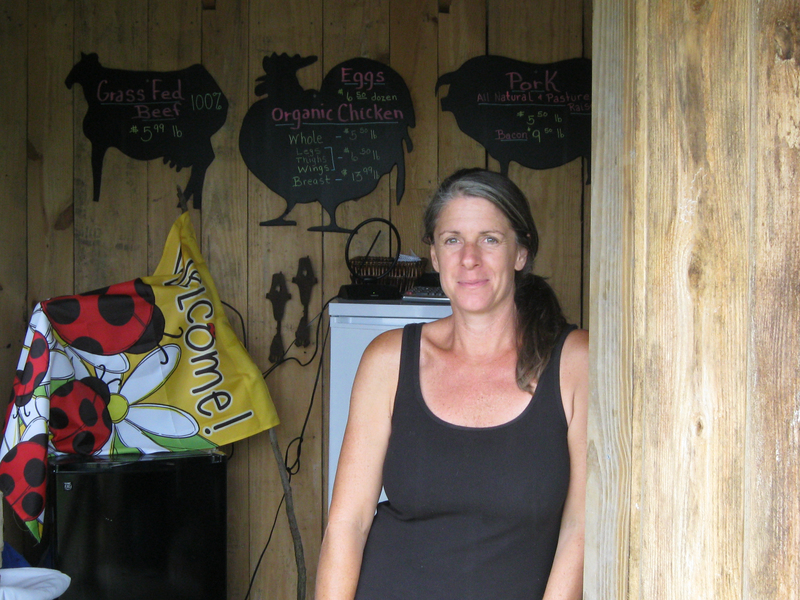The desire to know more about how food is produced is fueling a local food movement, and one Georgetown farmer hopes to show residents how organic food became her passion.
Carolyn Berl Donald has been operating The Organic Farm of Delaware Inc. in Georgetown as a wholesale operation for more than seven years. Now she wants residents to see for themselves why organic food and farming is important.
The organic farm opened to the public in May. It showcases free-range broiler chickens, which are raised for meat, as well as herds of brown sex-link chickens, which are the egglayers. The farm also houses four pigs, several geese, ducks and 40 acres of organic farmland.
Donald works with other area organic growers such as C&J Farm in Seaford, which raises grass-fed beef, and Swallow Acre Farm in Georgetown, which raises organic pork.
"It's a very tough business to make money in," Donald said. "But, we do it because it is our passion."
Donald and her sisters grew up in Wilmington in a farming area. They saw firsthand the value of farm-to-table living.
"I guess we got the farming bug," Donald said. "At one point we were all looking for land to have a farm, so we got together and purchased these 40 acres in Georgetown."
When Donald, her two sisters and her husband purchased the property, it was a blank slate surrounded by patchy trees along the perimeter. The family worked to bring back the natural qualities of the soil, Donald said.
"It took a long time before we started seeing worms and wildlife again," she said. "Now when you look around there are all sorts of birds and animals."
Working with the U.S. Natural Resources Conservation Service, Donald was able to get grants to build a pond, dig a well and power it with a solar array, as well as plant native trees to create a habitat for the animals.
"Grants through NRCS gave us a high tunnel, trees and solar panels on the chicken house and well," she said. "When our electricity went out, we still had water because of the solar power."
The family took classes with Gordon Johnson of the University of Delaware extension office in Georgetown to learn about organic farming and the business side of farming.
"We've come so far because of the help we've received," Donald said. "Now the land has such a balance, and we keep it in balance by keeping animal welfare as our top priority."
Donald and her family planted a variety of rye, clover and other grasses for the chickens to eat. They rotate the chickens so the animals always have fresh, short grass to eat. She said they have cut back on the amount of organic feed because the chickens prefer the grass.
"By allowing naturally occurring bacteria and worms to thrive, and providing them with a consistent source of food(carbon nitrogen), they continuously create soil," said Donald. "We use a practice of cover-cropping. By using plants such as red clover in our fields, it naturally retrieves nitrogen from the atmosphere and fixes it into the soil to aid plant growth. It is an excellent food source for livestock and very rich in omega 3. It also creates plenty of carbon to build soil."
Donald said animals are more balanced when they are grazing on fresh grasses and roaming the land. By keeping the animals balanced, the meat that humans consume is then more balanced and includes more vitamins than animals just raised on corn-based feed.
"It's been about 10 years of hard work, but I am so proud of how far we've come," Donald said.
Donald said she chose sex-link chickens because they are good egglayers and because the sex is linked to the color, it is easy to tell which baby chickens are females. All brown sex-link chickens are females, while the males are white. All of the chickens come from a single hatchery so that they are all high-quality and similar, Donald said.
She also rescued two pigs from an animal shelter and purchased two others. She built paths in the woods for the foraging pigs, as well as a pen so they can enjoy the sun.
During a recent weekend, visitors drove down the gravel lane of the farm and stopped to take pictures of the chicken houses on wheels. Many residents visit the farm to see the animals, but they also buy free-range whole chickens, grass-fed beef, fresh eggs and vegetables grown in Donald's garden or by other area producers.
While Donald sells directly to the public, she also sells on the wholesale market and through an organic farming website - www.eatwild.com.
"When people come out, they can experience the food and they can feel good about the food because they see how it is raised," Donald said. "They feel good because they know it nourishes their body, and by buying it here they support our mission of organic farming."
The organic farm is located at 23990 That Way, just west of Route 113 outside Georgetown. For more information, call 302-854-9260 or go to www.thefarmorganic.com.
History of sex-link chickens
Sex-links are cross-bred chickens whose color is linked to the sex of the chicken. Each brown baby chicken is a female and the white chickens are males. This allows growers to easily designate all brown chickens as egglayers and the roosters serve to fertilize the eggs for the next hatching. The males are also used for meat. Most sex-links are Rhode Island Reds mixed with Barred Rock or White Rock chickens, and are also known as Red Stars or Black Stars, depending on the color. Female sex-links can be extremely good egg-layers, often producing 300 eggs a year or more depending on the quality of care and feed.



















































